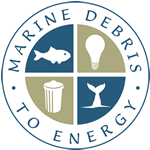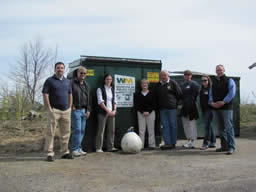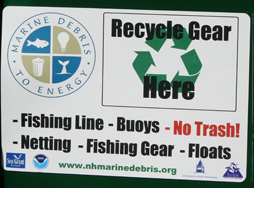
NH Marine Debris to Energy Project
A New Hampshire-based project to study marine debris at sea and on the shore, incorporating waste-to-energy and recycling as part of cleanup efforts.
want to go?
- Home
- Program Details
- Latest MDE News
- Get Involved
- Debris Reporting Forms
- Beach Debris Maps
- Beach Debris Reports
- Beach Debris Data
- Whale Watch Debris
- Whale Watch Debris Maps
- Side Scan Sonar Survey
- Contact Us
| Since Beach cleanups began along the northern NE coast there have been: |
|
| The top 5 types of debris found on local beaches for 2025 are: |
|
 The Marine Debris to Energy Project (MDEP) is an effort to study and cleanup marine debris from shorelines and coastal waters off New Hampshire. This is done through involving fishermen in disposal of derelict gear, conducting beach cleanups, surveying areas in the Gulf of Maine for underwater and floating debris, and integrating project data into this web site.
The Marine Debris to Energy Project (MDEP) is an effort to study and cleanup marine debris from shorelines and coastal waters off New Hampshire. This is done through involving fishermen in disposal of derelict gear, conducting beach cleanups, surveying areas in the Gulf of Maine for underwater and floating debris, and integrating project data into this web site.
How You Can Help:
- Recycle your fishing line! Contact Blue Ocean Society at info (at) blueoceansociety.org for drop-off locations
- Dispose of derelict fishing gear in the following ports:
- Portsmouth Fish Pier
- Rye Commercial Fish Pier
- Yankee Fishermen's Co-op in Seabrook
- Newington (Little Bay Lobster Company)
- Join a Blue Ocean Society beach cleanup! Click here for info
- Report litter you see!
- Teachers: Check out our interactive web site, and download lesson plans!
Resources for the Public, Resource Managers and Educators:
- Search our GIS maps for litter spotted at sea.
Thanks to Our Project Funders and Partners:
NOAA Marine Debris Program
Waste Management
Wheelabrator Technologies
Yankee Fishermen's Co-op
NH Port Authority
Atlantic Offshore Lobstermen's Association
Main Project Activities

- Researchers will make an initial assessment of the volume of underwater marine debris using sonar for the first time for this purpose in New Hampshire.
- Commercial and recreational fishermen will become actively involved in removing DFG at sea and collecting it in the Waste Management dumpster at theYankee Fisherman's Co-op.
- Fishermen will have access to bins where they can discard their fishing line for recycling.
- Anyone collecting marine debris will be able to report it online via an easy Web interface.
- Cleanups along the New Hampshire coastline will expand, involving more volunteers and creating more aesthetically-pleasing, healthier and safer beaches.
- Members of the public, schools, and scientific researchers will have access to interactive marine-debris data and GIS maps.
- Teachers and their students across the world will have access to marine-debris data to use in their lessons, and local schools will be able to work directly with project investigators and partners in viewing data, participating in cleanups and contributing to the database.
- Project staff and others around the world can use the data and protocols developed in this project to target further pollution-prevention and outreach efforts.
- The quantities of debris in the ocean and on the shore, potentially harmful to wildlife, people, vessels, and the economy, will diminish.
This study is funded by NH Sea Grant and through a grant from the NOAA Marine Debris Program.
Site design and hosting by the University of New Hampshire Cooperative Extension.




